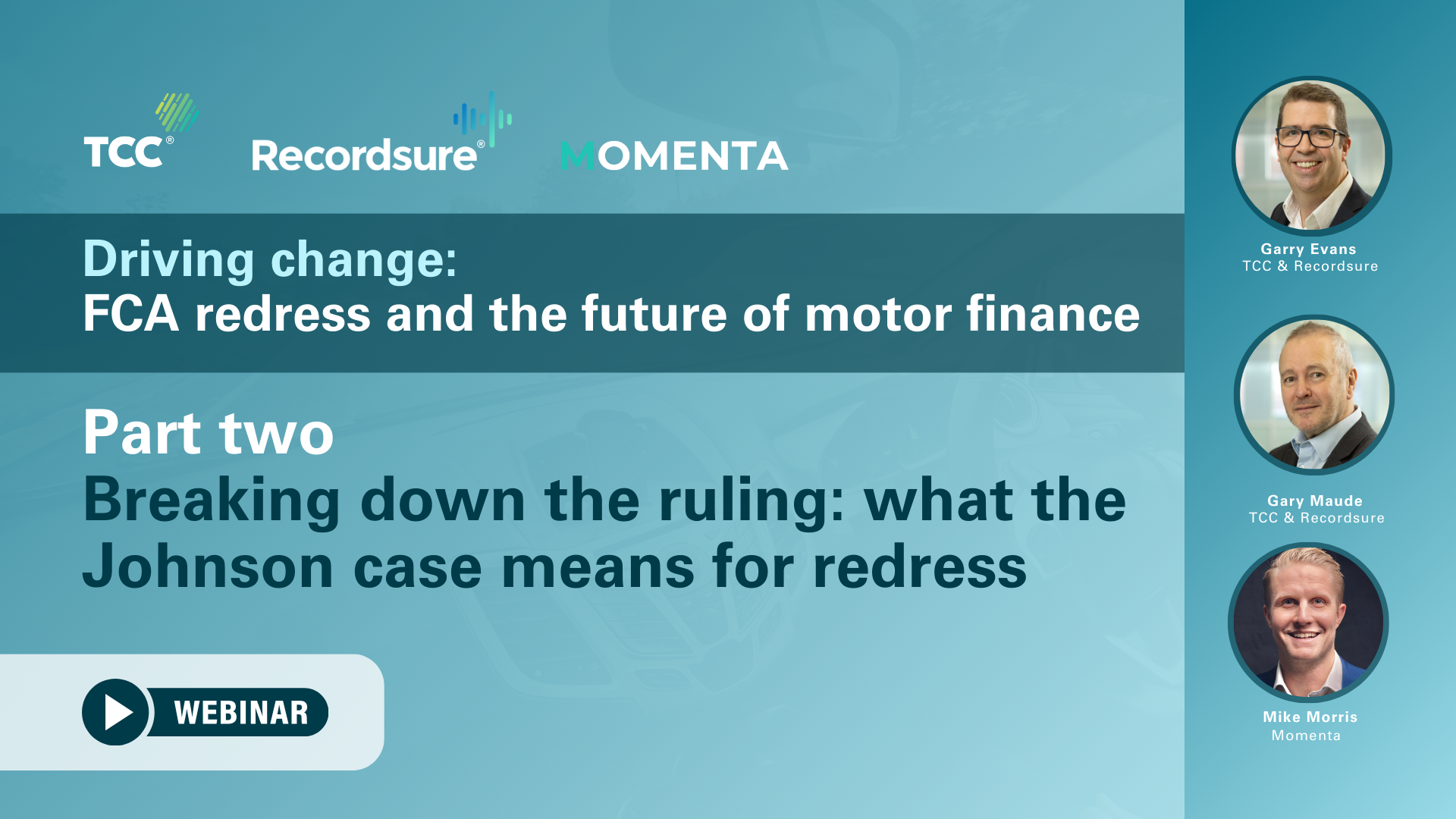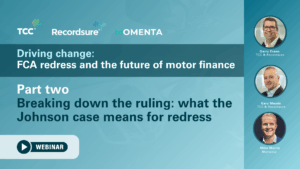Breaking down the ruling: what the Johnson case means for redress
20 August 2025
The Supreme Court’s recent ruling on discretionary commission arrangements (DCAs) has sent shockwaves through the motor finance sector, with far-reaching implications for redress and complaint handling. In this part of our webinar, Gary Evans and Gary Maude break down the facts — from the FCA’s announcement of a forthcoming compensation scheme to the key findings of the Johnson case. They explain how the decision has narrowed in scope yet added complexity, and what this might mean for firms already managing a high volume of complaints.
Garry Evans- Chief Product Officer and Chief Commercial Officer for TCC Group
We’re going to start today with a recap of the facts on the Supreme Court ruling on DCA and the FCA’s commentary and plans. Gary, can I hand over to you please?
Gary Maude- Director of Advisory Services for TCC Group
Absolutely. On Sunday, 3rd of August, the FCA confirmed it was to consult on a compensation scheme, which we mostly I guess, on the call, all know seeking to provide redress to consumers who were treated unfairly when they took out motor finance. That announcement followed the Supreme Court’s landmark ruling on those three cases, which we are equally aware of, that had concluded commission payments to car dealers were unlawful and which had some potential wider, connotations for commission arrangements in general.
Now, the Supreme Court overturned two of those cases, having one other case which I believe is the Johnson case, the Supreme Court ruled that circumstances of the case, the commission arrangements, resulted in an unfair relationship between the consumer and the lender under the Consumer Credit Act, and therefore the commission was unlawful.
Now it’s clear the FCA believes that a formal compensation scheme is the best way forward, but they’ve still to provide clarity and certainty to firms and investors as quickly as possible. Which should hopefully give us some consistency going forward in terms of how we’ll get handle on complaints and how we’re going to handle those complaints, which have picked up over the last year.
The FCA have committed to publishing a consultation paper by early October 25 which will set out proposals for a compensation scheme and the FCA anticipates that the scheme will be finalised in time for complainants to start seeking compensation next year. But from speaking to some of you on the call, we’re aware of the volumes of complaints you’ve had and we’re also aware how difficult it can be for you in terms of provisioning this exercise, you know, on what is possibly going to happen going forward.
The FCA have stated they’ll probably propose a scheme that covers discretionary commission arrangements with, some further dialogue in this in this webinar around opt in and opt out implications. Back to you.
Garry Evans- Chief Product Officer and Chief Commercial Officer for TCC Group
Thanks Gary. Before we get to some of the detail of what else the Supreme Court opined on, I want to pose a question to our webinar audience, about how you felt after the long awaited ruling. Did the kind of overruling of two of the cases and the narrowing of the focus on Johnson make you feel more or less comfortable than before? So I’ll give you kind of ten – fifteen seconds, in the audience to, to vote on that. And then we will show the results.
Let’s take a look at the results. Oh, well. That’s interesting. There’s a real balance there. Like I said, this is a I guess it’s a seesaw effect of what is expected to be a much lower redress of value expectation, which will give some boards some relief on the one side with the additional complexity of having to triage and manage all of that non DCA complaints on the other side.
It does muddy the water and I suppose it makes it so that it’s not all good news and that does appear to be how our audience is finding it. That’s a nice segue actually into talking a bit more about the complexity of the unfair practices the Supreme Court talked about at length, and the implications for the stakeholders in the remediation process as a result.
Ready to see the full webinar – you can watch the full 30 minutes here.
This recap sets the stage for the deeper discussion to come – one where lower expected redress values are tempered by operational challenges in triaging non-DCA complaints. The mixed audience poll results reflect the sector’s uncertainty: some relief on liability, but heightened complexity in execution. As the FCA moves towards its October consultation, understanding both the letter and spirit of the ruling will be critical for finance providers seeking to prepare effectively.
If you need guidance on interpreting the ruling, assessing your complaint exposure or preparing for a redress scheme, TCC, Recordsure and Momenta can provide the regulatory insight, operational support, and technology to help you navigate this transition with confidence.


